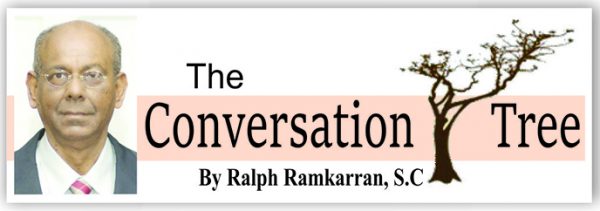Political leadership transitions can sometimes be full of drama. The transition to Desmond Hoyte after Burnham’s passing in 1985, was followed by the expulsion of its second most powerful leader, Hamilton Green, then a gradual but wholesale demolition the ‘left wing’ of the Peoples National Congress (PNC). Hoyte remained Party Leader until 2002, for the remainder of his life. Robert Corbin succeeded Hoyte without serious opposition. David Granger’s nomination by the PNCR as Presidential Candidate was orchestrated smoothly by Mr. Corbin, who stood down. After the PNCR, at the 2011 elections, with the Alliance for Change (AFC), brought the Peoples Progressive Party (PPP) down to a minority and Granger announced that he would contest the position of Leader, Corbin did not contest and ensured Granger’s victory.
On Friday last SN reported, quoting an unnamed source, that the Central Executive Committee (CEC) of the PNCR had deliberated on and passed two motions brought against Party Leader David Granger. At least one motion concerned the admittance of two recently formed, allegedly “shell parties,” Equal Rights and Justice Party and Guyana National Builders Movement, to A Partnership for National Unity (APNU). It is not known what the other motion was about. On Saturday Mr. Granger denied that motions were passed against him at the meeting of the CEC on Thursday. As SN reported, the source amended the story. It was a faction of the CEC that met with members in districts and passed the motions.
 Public perceptions suggest that the time has arrived for a leadership transition in the PNCR. Ousted from office in 1992 after holding power for 28 years, it took 23 years to win the government again, this time as the APNU alliance with several parties, mainly the AFC. The AFC had demonstrated some electoral attractiveness and adaptability. In 2006, it took its votes from PNCR supporters, taking 5 seats in the National Assembly. With a change of leadership from Robert Corbin to David Granger for the 2011 elections, the PNCR retrieved its 5 seats and customary 40 percent of the vote.
Public perceptions suggest that the time has arrived for a leadership transition in the PNCR. Ousted from office in 1992 after holding power for 28 years, it took 23 years to win the government again, this time as the APNU alliance with several parties, mainly the AFC. The AFC had demonstrated some electoral attractiveness and adaptability. In 2006, it took its votes from PNCR supporters, taking 5 seats in the National Assembly. With a change of leadership from Robert Corbin to David Granger for the 2011 elections, the PNCR retrieved its 5 seats and customary 40 percent of the vote.
The AFC survived the loss of its 2006 PNCR votes in 2011 by making significant inroads into the PPP/C support base, enough to degrade it electorally to a minority, but still the largest single party, entitling it to form the government. Not surprisingly, at the 2015 elections, the APNU coalition won a slim overall majority. In 2020 the AFC lost the PPP/C votes it had attracted in 2011, thereby causing APNU to lose the elections.
The trauma of 2020, resulting from Mr. Granger’s concession after party-wide mobilization for a five-month effort to rig the elections, and various other factors, including the dismissal of thousands of sugar workers thereby weakening the AFC, the age of Mr. Granger (he will be 80 at the next elections in 2025) and his uncertain health, the growing prominence of a younger generation of leadership, have been responsible for the surge of disharmony within the PNCR, signifying that a leadership change might be imminent. The above situation has combined to invite the challenges that his leadership now faces.
Indications are that Mr. Granger has assessed this situation and has sought to manage the transition, either to a new Party Leader or to put in place Mr. Joe Harmon as the strongest candidate to eventually succeed him. To effect this, Mr. Granger omitted from the National Assembly all those PNCR leaders who were senior to or can challenge Mr. Harmon, such as Volda Lawrence, who defeated Mr. Harmon for the post of Party Chair in 2019, former Party Chair and Attorney General, Basil Williams, General Secretary Amna Ally, and other senior leaders, such as Mr. Aubrey Norton and former Foreign Minister Carl Greenidge. This situation was clearly contrived to ensure that Mr. Harmon would be elected as Opposition Leader, as indeed he was.
It is not known whether Mr. Granger intended to decline nomination for the position of Party Leader at the next Party Congress, in the expectation that Mr. Harmon would, as Opposition Leader, have been smoothly ushered in as Party Leader. But the brewing rebellion may have demonstrated to Mr. Granger that a seemless transition to Mr. Harmon was not going to happen. Mr. Granger’s TV interview on Friday suggests that he will contest for the post of Leader once again. One candidate, Mr. Aubrey Norton, has already declared. It is not known if the popular Ms. Volda Lawrence will contest. If she does, these will be formidable challenges. Ms. Lawrence, having already defeated Mr. Harmon for Chair of the PNCR in 2019, could again potentially do so.
The most critical actor in this entire scenario would be Mr. Robert Corbin. Mr. Corbin was perceptive enough after 2006, with the loss of 5 seats in the National Assembly to the AFC, and internal opposition to his leadership, to recognise the need for change. He oversaw the smooth transition to Mr. Granger as Presidential Candidate then, later, his highly controversial election as Leader. Mr. Corbin’s support is vital for the success of any candidate. It is likely that, with no further personal political ambitions, his pre-eminent consideration would be what, in his view, is best for the party.









